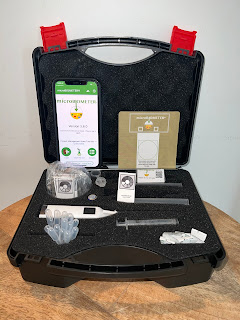Can Microbiometer Research Unlock Sustainable Agriculture Practices?
In the world of agriculture, a tiny but powerful device called the microbiometer is making big waves. This innovative technology has the potential to revolutionize farming practices and promote sustainability. In this blog, we'll explore how microbiometer research can unlock sustainable agriculture practices for a greener and more abundant future
The Microbiometer: A Peek into the Microbial
World
Meet
your tiny allies
Microbiometers:
What Are They?:
Microbiometers are advanced tools that help scientists study the complex world of microorganisms in soil. They allow us to identify and understand the diverse communities of bacteria, fungi, and other microscopic life forms that inhabit our soil.
Why
Microbes Matter:
Microbes play a
vital role in soil health and plant growth. They help decompose organic matter,
fix nitrogen, and even protect plants from diseases. Understanding these tiny
allies is key to sustainable agriculture.
Diversity
is Strength:
Microbiometer research reveals the incredible diversity of microorganisms in soil. The more
diverse the soil microbiome, the more resilient it is to environmental
stressors.
Soil Health and Nutrient Cycling
Healthy
Soil, Healthy Plants:
Microbiometer
research helps us assess soil health. A balanced soil microbiome promotes
nutrient availability and enhances plant growth, reducing the need for chemical
fertilizers.
Nutrient
Cycling:
Microbes break
down organic matter, releasing essential nutrients like nitrogen and phosphorus
into the soil. This natural process reduces the need for synthetic fertilizers,
which can harm the environment.
Pest
and Disease Suppression:
Some soil microbes act as natural protectors, suppressing harmful pathogens and pests, and reducing the need for chemical pesticides.
Sustainable
Practices Enabled by Microbiometer Research
Precision
Agriculture:
Armed with
microbiometer data, farmers can implement precision agriculture techniques.
They can target specific areas of their fields that need improvement, reducing
waste and resource use.
Reduced
Chemical Inputs:
Microbiometer-guided
practices often lead to a decrease in the use of synthetic chemicals, making
agriculture more eco-friendly.
Crop
Rotation and Cover Crops:
Microbiometer research helps in selecting the right crops and cover crops to enhance soil biodiversity and nutrient cycling.
Challenges and Future Prospects
Challenges:
Despite the enormous potential of microbiometer research, there are some difficulties. The complexity of soil microbiomes is still being uncovered by researchers, and turning this information into useful applications can be challenging.
Collaboration
is Key:
In order to promote the adoption of
sustainable agriculture practices based on microbiometer research, scientists,
farmers, and policymakers must work together.
Future:
As technology develops, microbiometer tools will be easier to use and more accurate. More farmers will adopt sustainable practices as a result of this.
Conclusion
The development
of microbiometers offers hope for the future of agriculture. We have the
ability to make farming a more environmentally friendly and sustainable
activity by solving the mysteries surrounding soil microbiomes and recognizing
their critical function in soil health, nutrient cycling, and insect control.
By purchasing goods that prioritize soil health and supporting sustainable
agricultural practices, consumers can also make a difference. Together, we can
help to create a future in which agriculture not only nourishes the planet but
also feeds the globe.
So, the next time you enjoy a bountiful harvest of fresh, sustainably grown produce, you can appreciate the silent heroes beneath your feet—the microorganisms that are helping to make it all possible. Microbiometer research is shedding light on their importance and paving the way for a more sustainable and resilient agricultural future.




Comments
Post a Comment